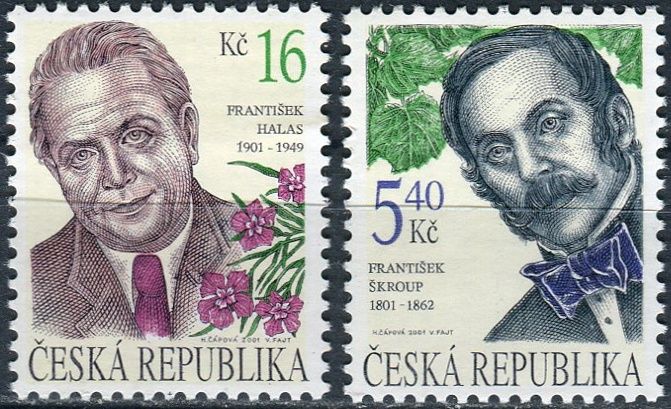- Home
- Philately: postage stamps
- Philately: stamps of the Czech Republic
- Czech Republic
- Net
- 2001
- (2001) MiNo. 291 - 292 ** - Czech Republic - Personalities
(2001) MiNo. 291 - 292 ** - Czech Republic -Personalities
Czech Republic - postage stamps

| Code: | cz293-294 |
| Producer: | Česká pošta |
| Price: | 1,08 EUR |
| Total discount: | 4 % |
| Before: | 1,13 EUR |
| Availability: | In Stock |
| Stock: | 1 Pcs |
| Year: | 2001 |
| Condition: | ** |
| Cat. number (POFIS): | 293 - 294 |
| Catalogue no. (MICHEL): | 291 - 292 |
| Cat. number (St. Gibbons): | 296 - 297 |
| Cat. number (Yvert et Tellier): | 274 - 275 |
| Topic: | osobnosti |
Stamp 5,40,-Kč - František Škroup (1801-1862)
Music composer and author of the Czech national anthem
František Škroup was an important Czech composer of the 19th century who made an indelible mark on the history of Czech culture. He was born on 3 June 1801 in Osice near Hradec Králové and died on 7 February 1862 in Rotterdam, the Netherlands. His life and work are inextricably linked to the Czech national revival and the development of modern Czech music.
Author of the music for the Czech national anthem
His greatest fame came from the melody to the song "Kde domov můj", which was first heard in 1834 as part of the theatre play Fidlovačka aneb Žádný hněv a žádné rvačka, written by Josef Kajetán Tyl. František Škroup's music and J. K. Tyl's lyrics created a song form that quickly spread among the public and gradually became popular. In 1918, this song became the anthem of independent Czechoslovakia and later the Czech Republic.
The Pioneer of Czech Opera
František Škroup was a pioneer of Czech opera. In 1827 he composed the first Czech song opera The Wireman, which was performed at the Estates Theatre in Prague. He created operas not only on Czech but also on German texts. During his career he became Kapellmeister of the Estates Theatre, where he was instrumental in staging Czech operas and in promoting Czech works at a time when the German repertoire was predominant in the Czech lands.
Cultural and social contribution
The group actively participated in the cultural life of its time. His work had not only artistic but also political value - it supported the idea of the Czech nation, linguistic identity and cultural independence. He composed church music, songs and choral compositions. He was known as a man with a firm moral stance and patriotic mindset.
Activities abroad
Towards the end of his life he accepted the post of musical director in Rotterdam, where he also died in 1862. Despite his departure abroad, his name remains linked to Czech musical history and national identity.
Stamp 16 Kč - František Halas (1901-1949)
Poet of the Czech spiritual landscape
František Halas is one of the most important Czech poets of the 20th century. He was born on 3 October 1901 in Brno and died on 27 October 1949 in Prague. His work reflects existential anxiety, personal and social upheaval, and the search for the meaning of human existence in the modern world.
Origin and Intellectual Formation
Halas came from a working-class background. His father was a textile worker and folk storyteller, which influenced Halas's sensitivity to language and social issues. Although he had no formal university education, he became an important figure in interwar literature thanks to his independent reading, his deep interest in philosophy and his contacts with the Czech cultural elite.
Poetry
Halas's poetry is characterised by its linguistic density, imagery and existential dimension. His debut collection "Sepia" (1927) already indicated his interest in death, silence and solitude. The following collection "The Cock Shies Death" (1930) was heavily influenced by surrealism and expressionism.
His best-known collections include:
-
"Torso of Hope" (1938) - responds to the Munich betrayal and the loss of Czechoslovak statehood.
-
Our Lady Božena Němcová (1940) - a tribute to the Czech literary tradition, but also a symbolic image of the homeland.
-
"I'll Be Back There" (1947) - an expression of the relationship to the homeland and the Brno countryside.
Political and cultural context
During World War II, Halas joined the domestic resistance and contributed to underground magazines. After the war, he became a member of the National Assembly for the Communist Party and was active in cultural politics. His attitude towards communism was idealistic, but some of his positions were later criticized for uncritical acceptance of the ideology.
Language and style
František Halas is known for experimenting with language, using fragments, free verse and neologisms. His poetry is often difficult to interpret, but at the same time very impressive and emotionally powerful. He has often thematized death, pain, guilt, memory and silence.
Link
František Halas left a major mark on 20th century Czech literature. His work is part of the school curriculum, has been analysed many times by literary scholarship and continues to inspire poets and readers seeking an authentic expression of human experience.
From the Same Category - (2001) MiNo. 291 - 292 ** - Czech Republic -Personalities
Czech fish farming.